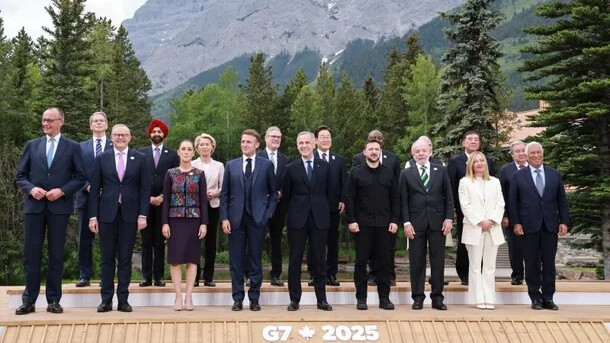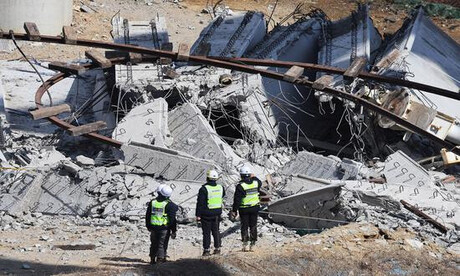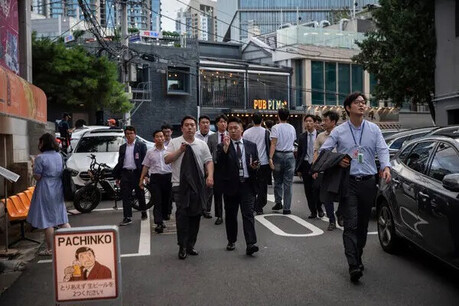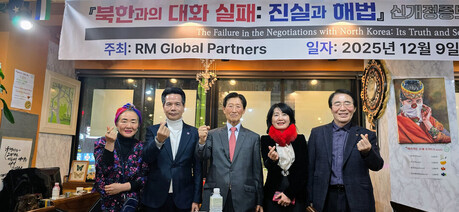
Kananaskis, Alberta, Canada – President Lee Jae-myung of South Korea concluded a rigorous two-day diplomatic agenda at the G7 Summit in Kananaskis, Alberta, engaging in a series of bilateral meetings with 11 international leaders, including G7 members and invited nations, as well as representatives from the United Nations and the European Union. The extensive talks focused on strengthening cooperation across various sectors, including free trade agreements (FTAs), defense, trade, and energy.
FTA Revisions and Defense Collaboration Take Center Stage
On June 17, President Lee held a significant meeting with UK Prime Minister Keir Starmer, with discussions primarily centered on the ongoing revision of the bilateral FTA. Following the UK's departure from the European Union in 2020, South Korea and the UK signed a separate FTA in 2021. Negotiations are currently underway to fine-tune specific items within the agreement. Prime Minister Starmer expressed a desire to "modernize the FTA between our two countries and strengthen cooperation on defense and security issues." President Lee concurred, stating that "further progress should be made on the revision of the FTA." This push for an updated FTA reflects both nations' commitment to adapting their economic ties to evolving global trade landscapes and enhancing strategic partnerships.
Expanding Security and Future Technologies with Canada
In talks with Canadian Prime Minister Mark Carney, President Lee prioritized strengthening cooperation in security and defense. Canada, a NATO member, has committed to a substantial increase in its defense budget, making it a key partner for South Korea in the defense industry. Beyond traditional security, the leaders also discussed collaboration on energy security, climate change, and future-oriented technologies such as artificial intelligence (AI). This multi-faceted approach underscores a shared vision for addressing both immediate geopolitical challenges and long-term global priorities. Canada, as the host nation for the 2025 G7 Summit held from June 16-17, played a pivotal role in shaping the agenda, which included "Protecting our communities and the world," "Building energy security and accelerating the digital transition," and "Securing the partnerships of the future."
Deepening Strategic Ties with India and Brazil
President Lee's meeting with Indian Prime Minister Narendra Modi highlighted the upcoming 10th anniversary of the "Special Strategic Partnership" between their nations. Prime Minister Modi reciprocated, advocating for expanded cooperation in "core technologies, defense, and cultural exchange." This emphasizes the growing importance of South Korea-India relations in regional and global strategic frameworks, particularly as both countries seek to diversify supply chains and enhance technological capabilities.
A notable exchange occurred during President Lee's meeting with Brazilian President Luiz Inácio Lula da Silva. President Lee shared a personal anecdote about injuring his arm in a factory press as a child worker. This resonated deeply with President Lula, who himself left elementary school early to work as a lathe operator before entering politics. Reportedly, President Lula inquired about the age at which President Lee sustained his injury, showing genuine interest and fostering a strong personal connection between the two leaders, both of whom have humble beginnings and rose to the highest office. Brazil's participation in the G7 as an invited guest signifies its increasing influence in global affairs and its potential for stronger partnerships with East Asian economies.
A Brief Encounter with Ukraine's President Zelenskyy
While a full bilateral summit with Ukrainian President Volodymyr Zelenskyy was not held, President Lee and President Zelenskyy exchanged a brief handshake and eye contact during a commemorative photo session. The absence of a formal meeting suggests that while solidarity with Ukraine remains important, more extensive discussions may be slated for future diplomatic engagements. Ukraine was among the invited guest countries to the 2025 G7 Summit, underscoring the ongoing international focus on the conflict and its implications for global stability.
President Lee's intensive diplomatic schedule at the G7 Summit demonstrates South Korea's active role in global governance and its commitment to fostering robust international partnerships in a rapidly changing geopolitical landscape. The discussions laid the groundwork for enhanced cooperation across critical sectors, signaling South Korea's intent to contribute to global peace, prosperity, and technological advancement.
[Copyright (c) Global Economic Times. All Rights Reserved.]





























